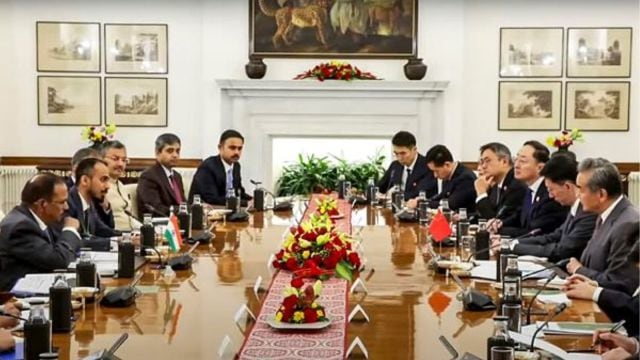ARTICLE AD BOX
 National Security Advisor Ajit Doval with Chinese Foreign Minister Wang Yi during a meeting, in New Delhi. (PTI)
National Security Advisor Ajit Doval with Chinese Foreign Minister Wang Yi during a meeting, in New Delhi. (PTI)
National Security Advisor (NSA) Ajit Doval told visiting Chinese Foreign Minister Wang Yi on Tuesday that the India-China border has been “quiet” and there has been an “upward trend” in bilateral ties.
Speaking at the 24th Special Representative-level talks on the boundary issue, Doval said in Delhi that Prime Minister Narendra Modi will be visiting China for the Shanghai Cooperation Organisation (SCO) leaders’ summit — in the first official confirmation of the PM’s visit to Tianjin during August 31-September 1.
Wang and Doval are the designated Special Representatives for the boundary talks. Doval travelled to China in December last year for talks after the border standoff following the clashes between Indian and Chinese troops in Galwan in June 2020.
Doval said PM Modi and Chinese President Xi Jinping met at the BRICS leaders’ summit in Russia’s Kazan in October last year and were able to set a “new trend” following which “we have profited a lot”, and the bilateral engagements have been “substantial”. “The new environment” that has been created has “helped us in moving out in the various areas that we were working on,” he added.
Making his opening statement, Doval said, “I’m very hopeful that, like the last one, this 24th Special Representative level talks would be equally successful.” He also referenced the 75th anniversary of India-China diplomatic relations and commended Wang’s “personal efforts” and “the maturity and the sense of responsibility”.
This is the first visit by a Chinese minister since PM Modi and Xi Jinping met in Kazan and set the stage for the disengagement of troops at two friction points along the Line of Actual Control (LAC) in eastern Ladakh, and the resumption of patrolling.
Wang will also call on PM Modi on Tuesday. He did not get a meeting with Modi during his last visit in April 2022.
Story continues below this ad
In his opening statement, Wang said that “the setbacks we experienced in the past few years were not in the interests of the people of our two countries.”
“That (Kazan) meeting pointed the direction for the development of our bilateral relations and provided impetus for the proper settlement of the boundary question. We had a very good 23rd Special Representative talks at the end of last year. At that meeting, we reached a new and important consensus on the management of disagreements, stable borders and moving toward a settlement.”
“We identified specific goals and formed a working framework,” he said, adding that “we are heartened to see the stability that is now restored in the borders”.
Wang said the Chinese side attaches great importance to PM Modi’s visit to China for the SCO summit, and said, “We believe that the Indian side will also make a contribution to a successful summit in Tianjin”.
Story continues below this ad
He said a “healthy and stable China-India relationship serves the fundamental and long-term interests of both of our countries. It is also what the developing countries want to see. Our two sides should follow the strategic guidance of our leaders”, and advance the ties in a “healthy and sound manner”.
PM Modi is set to travel to Tianjin in China for the SCO leaders’ summit amid efforts by the two sides to repair bilateral ties. If the visit materialises, he is expected to hold bilateral talks with Xi amid rising tensions with the US over trade tariffs and the purchase of Russian oil.



.png)
.png)
.png)

























 English (US) ·
English (US) ·